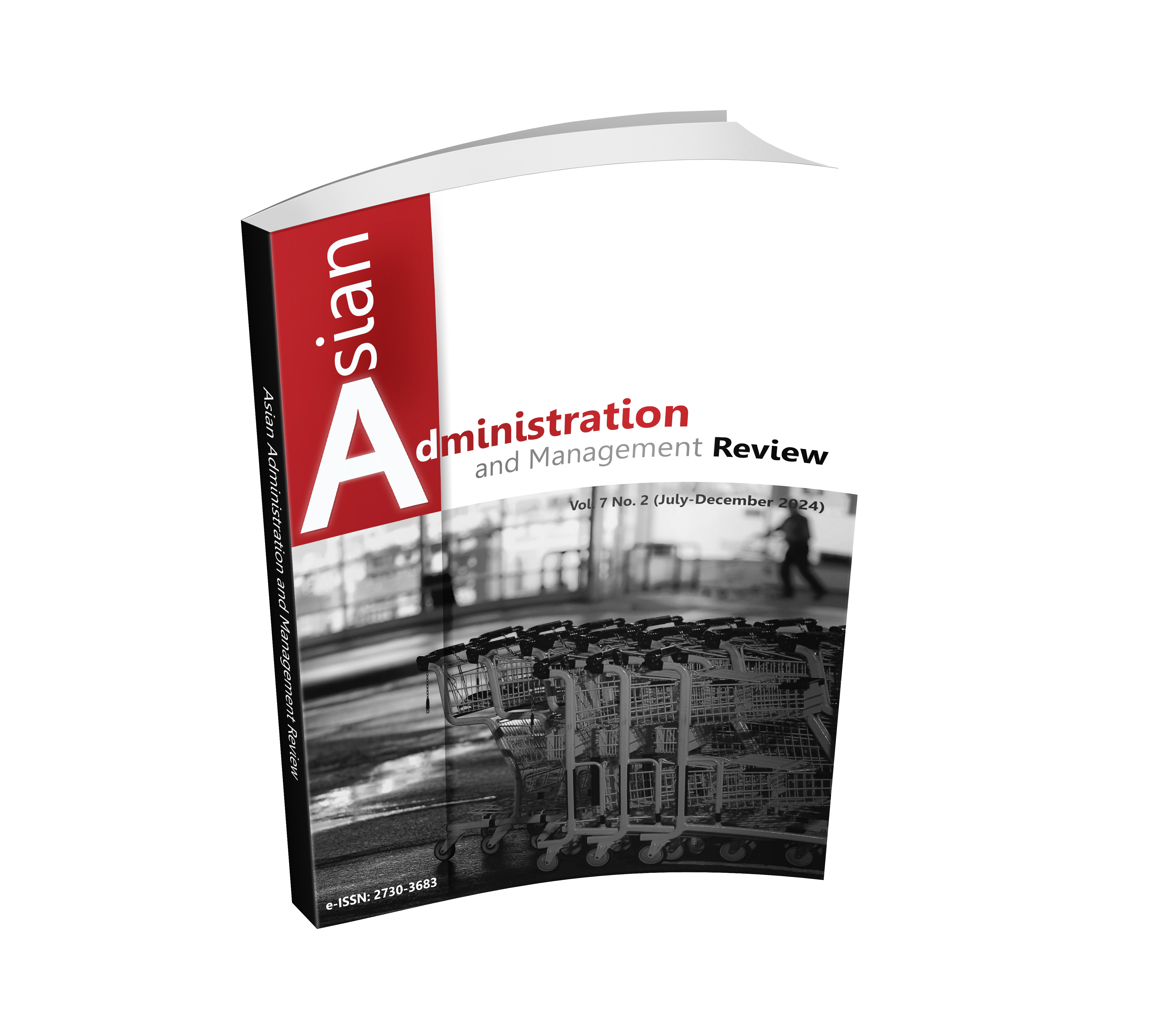AN IN-DEPTH EXPLORATION OF THE NEXUS BETWEEN GREEN MARKETING, PERCEIVED ENVIRONMENTAL RESPONSIBILITY, AND GREEN PURCHASE INTENTIONS
DOI:
https://doi.org/10.14456/aamr.2024.22Keywords:
Green Purchase Intentions, Green Marketing, Perceived Environmental ResponsibilityAbstract
This research aims to investigate and compare personal factors that influence the intention to purchase environmentally friendly products, as well as examine green marketing, perceptions of environmental responsibility, and consumers' purchase intentions for these products. This research applied the quantitative method to collect data from 400 consumers who had purchased environmentally friendly products. Statistics used in data analysis included percentage, mean, standard deviation, frequency, t-test, F-test, and multiple regression analysis. The results indicate that different personal factors have no different effect on the intention to purchase environmentally friendly products. Perceived environmental responsibility and green marketing (green price, green product, and green place) affect the intention to purchase environmentally friendly products. Entrepreneurs or marketing departments can use the results of this research as a strategy to create consumers' purchase intentions for environmentally friendly products.
Downloads
References
Ajzen, I. (1991). The Theory of Planned Behavior. Organizational Behavior and Human Decision Processes, 50(2), 179-211.
Ali, A., Khan, A., Ahmed, I., & Shahzad, W. (2011). Determinants of Pakistani Consumers' Green Purchase Behavior: Some Insights from a Developing Country. International Journal of Business and Social Science, 2(3), 217-226.
Ansar, N. (2013). Impact of Green Marketing on Consumer Purchase Intention. Mediterranean Journal of Social Sciences, 4(11), 650-655.
Ansu Mensah, P. (2021). Green product awareness effect on green purchase intentions of university students’: an emerging market’s perspective. Future Business Journal, 7, 48.
Arseculeratne, D., & Yazdanifard, R. (2014). How Green Marketing Can Create a Sustainable Competitive Advantage for a Business. International Business Research, 7(1), 130-137.
Arslan, M., & Zaman, R. (2014). Impact of Dividend Yield and Price Earnings Ratio on Stock Returns: A Study Non-Financial Listed Firms of Pakistan. Research Journal of Finance and Accounting, 5(19), 68-74.
Beckford, C., Jacobs, C., Williams, N., & Nahdee, R. (2010). Aboriginal Environmental Wisdom, Stewardship, and Sustainability: Lessons from the Walpole Island First Nations, Ontario, Canada. The Journal of Environmental Education, 41(4), 239-248.
Belz, F., & Peattie, K. (2009). Sustainability Marketing: A Global Perspective. New Jersey: John Wiley & Sons, Inc.
Chayomchai, A. (2019). Key Factors Affecting Product Awareness and Purchase Decision: A Study on Green Marketing and Consumer Attitudes in Green-Based City. Asian Administration and Management Review, 2(2), 10-22.
Chen, C., Chong, K., Tan, T., & Wang, H. (2023). Mechanism of Green Finance Awareness on Sustainable Competitiveness of SMEs. Environment-Behaviour Proceedings Journal, 8(24), 29-47.
Choshaly, S. (2017). Consumer Perception of Green Issues and Intention to Purchase Green Products. International Journal of Management, Accounting and Economics, 4(1), 66-79.
Dangelico, R., & Vocalelli, D. (2017). “Green Marketing”: An analysis of definitions, strategy steps, and tools through a systematic review of the literature. Journal of Cleaner Production, 165, 1263-1279.
Durmaz, Y., & Akdogan, L. (2023). Exploring the Impact of Consumers' Attitudes towards Green Advertisements on the Intention to Purchase Green Products: The Mediating Role of Environmental Responsibility. Electronic Green Journal, 1(48), 1-37.
Hair, J., Black, W., Babin, B., & Anderson, R. (2010). Multivariate Data Analysis. 7th ed. New York: Pearson.
Jabeen, R., Khan, K., Zain, F., & Atlas, F. (2023). Buy green only: Interplay between green marketing, corporate social responsibility and green purchase intention; the mediating role of green brand image. Business Strategy & Development, 6(3), 503-518.
Lai, C., & Cheng, E. (2016). Green purchase behavior of undergraduate students in Hong Kong. The Social Science Journal, 53, 67-76.
Lavuri, R., Parida, R., & Singh, S. (2024). Unveiling ways to examine the purchase intension of green products in emerging markets. Benchmarking: An International Journal, 31(5), 1385-1401.
Mahmoud, T. (2018). Impact of green marketing mix on purchase intention. International Journal of Advanced and Applied Sciences, 5(2), 127-135.
Majeed, M., Aslam, S., Murtaza, S., Attila, S., & Molnár, E. (2022). Green Marketing Approaches and Their Impact on Green Purchase Intentions: Mediating Role of Green Brand Image and Consumer Beliefs towards the Environment. Sustainability, 14(18), 11703.
Noor, W., Hamdan, N., Zaman, N., & Othman, N. (2023). A Model of Factors Influencing Consumer Intention Behaviour in Purchasing Green Product. Advanced International Journal of Business, Entrepreneurship and SMEs, 5(16), 89-98.
Nyborg, K., Howarth, R., & Brekke, K. (2006). Green Consumers and Public Policy: On Socially Contingent Moral Motivation. Resource and Energy Economics, 28(4), 351-366.
Peattie, K. (1992). Green Marketing. Maryland: Pitman Publishing.
Prothero, A., Dobscha, S., Freund, J., Kilbourne, W., Luchs, M., Ozanne, L., & Thøgersen, J. (2011). Sustainable Consumption: Opportunities for Consumer Research and Public Policy. Journal of Public Policy & Marketing, 30(1), 31-38.
Rashid, N., Jusoff, K., & Kassim, K. (2009). Eco-Labeling Perspectives amongst Malaysian Consumers. Canadian Social Science, 5(2), 1-10.
Rasiah, R., SongLin, Kanjanapathy, M., & Chong, K. (2023). Towards a Greener Future: Exploring Factors Influencing Green Purchase Intention and Pro-Environmental Behavior among Young Consumers. Environment-Behaviour Proceedings Journal 8(26), 367-374.
Rodgers, W., Al-Shammakhi, B., Jeaneth, J., Wincent, J., & Adams, K. (2020). DIY Entrepreneurship: a decision-pathway framework for ethical thought structures. Technological Forecasting and Social Change, 161, 120290.
Shirsavar, H., & Fashkhamy, F. (2013). Green marketing: A new paradigm to gain competitive advantage in contemporary business. Trends in Advanced Science and Engineering, 7(1), 12-18.
Silpcharu, T. (2017). Research and Statistical Analysis with SPSS and AMOS. 17th ed. Bangkok: S.R. Print Mass Product Co., Ltd.
Vanichbuncha, K. (2012). Structural Equation Modeling: SEM. Bangkok: 3lada.
Vevere, V., & Shina, I. (2023). The Factors of Green Marketing Affecting Consumer Purchase Intention in Latvia. Environment Technologies Resources, 1(1), 240-246.
Yusof, J., Singh, G., & Razak, R. (2013). Purchase Intention of Environment-Friendly Automobile. Procedia - Social and Behavioral Sciences, 85, 400-410.
Zaheer, K., Khan, S., & Raees, M. (2023). The Role of GBK in Influencing Green Purchase Intention: A SEM Study of University Students. Voyage Journal of Educational Studies, 3(2), 243-259.
Zhao, X., & An, H. (2023). Research on the Mechanism of Heterogeneous Corporate Environmental Responsibility in Z-Generation Consumers’ Sustainable Purchase Intention. Sustainability, 15(13), 10318.

Downloads
Published
How to Cite
Issue
Section
License
Copyright (c) 2024 Authors

This work is licensed under a Creative Commons Attribution-NonCommercial-NoDerivatives 4.0 International License.











.png)


